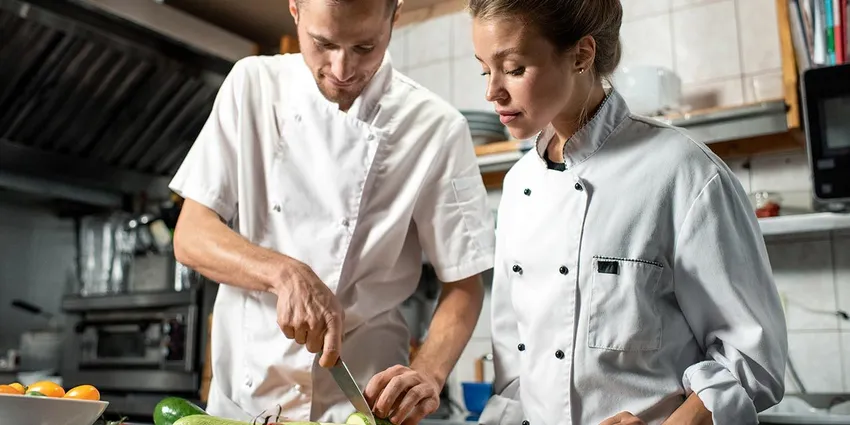Executive Chef vs Chef de Cuisine Key Takeaways:
- Executive Chefs oversee multiple venues, while Chefs de Cuisine manage a single kitchen hands-on.
- Executive Chefs earn 9% more, averaging $80,040 vs. $73,362 for Chef de Cuisines.
- Executive roles require more experience, typically 5+ years.
- In smaller restaurants, the Chef de Cuisine often handles Executive Chef duties.
Executive Chef vs Chef de Cuisine: while often used interchangeably, these roles differ in scope and hierarchy. Executive Chefs typically manage multiple venues within a group or brand, while a Chef de Cuisine or Head Chef runs a single kitchen, often hands-on. This guide breaks down their responsibilities, where they're hired, and what qualifications each role requires.
What is an Executive Chef?
An Executive Chef is responsible for the financial, operational and strategic aspects of a restaurant. This includes cost forecasting, establishing processes and developing menus that are aligned with the restaurant’s concept, target audience and the latest trends.
What is a Chef de Cuisine?
A Chef de Cuisine is in charge of hiring restaurant staff, maintaining food quality and improving customer satisfaction. Their main goal is to ensure smooth kitchen operations.
Executive Chef vs Chef de Cuisine: Key Differences
The key differences between an Executive and a Chef de Cuisine lie in their list of duties, qualifications and salary.
Responsibilities
Executive Chef Responsibilities:
- Strategic planning: Develop long-term culinary strategies, including menu development across multiple outlets, aligning with the brand's vision and market trends.
- Budget management: Oversee financial aspects such as food cost control, labor budgeting and procurement strategies to ensure profitability.
- Brand Representation: Act as the culinary face of the organization, participating in media engagements, culinary events and maintaining public relations.
Chef de Cuisine Responsibilities:
- Daily operations: Manage the day-to-day activities of the kitchen, ensuring timely and quality food service.
- Team development: Mentor and train kitchen staff, fostering skill development and maintaining high morale.
- Quality assurance: Conduct regular tastings and evaluations to maintain consistency and uphold the restaurant's culinary standards.
Qualifications
- Work experience: Chef de Cuisine employers in New York City require applicants to have at least two years of supervisory experience. Meanwhile, most establishments hiring Executive Chefs in New York City need applicants to have a minimum of five years of experience in a leadership position.
- Skills: An Executive Chef needs advanced skills in written communication, budgeting and brand management. A Chef de Cuisine, on the other hand, is generally focused on practical kitchen skills and people management abilities, such as operating equipment and using Chef knives, maintaining adherence to food safety and sanitation guidelines and evaluating and coaching the kitchen team.
- Culinary education: Executive Chefs are generally expected to have a culinary arts degree, specifically a bachelor’s degree. Chef de Cuisine employers prefer candidates with at least a culinary diploma.
Educational requirements
Understanding the educational pathways and certifications pertinent to both Executive Chefs and Chefs de Cuisine can provide clarity for aspiring culinary professionals.
Educational Requirements:
- Formal education: Many Chefs pursue formal culinary education through accredited institutions, obtaining diplomas or degrees in culinary arts. This foundational knowledge is crucial for advanced culinary techniques and kitchen management.
- Apprenticeships: Hands-on training under experienced chefs allows aspiring professionals to gain practical experience and industry insights, which are invaluable in their career progression.
Certifications:
- Certified Executive Chef (CEC): Offered by the American Culinary Federation (ACF), this certification requires a combination of education and extensive professional experience, validating a chef's expertise in kitchen management and culinary skills.
- Certified Chef de Cuisine (CCC): Also provided by the ACF, this certification focuses on the competencies required for a Chef leading a single kitchen, emphasizing both culinary skills and leadership abilities.
Pursuing these educational opportunities and certifications not only enhances a Chef's credibility but also opens doors to advanced positions within the culinary hierarchy.
Salary
Executive Chefs in the U.S. earn 9% more than Chef de Cuisines, with an average salary of $80,040 per year. Meanwhile, Chef de Cuisines receive $73,362 annually.
Salaries for both positions can vary according to location, type of establishment and culinary experience.
Establishments That Hire Executive Chef and Chef de Cuisine
Based on our Executive Chef job listings, establishments that typically hire Executive Chefs are international restaurant, retail and hospitality groups that have multiple locations. This includes renowned companies like Pyramid Global Hospitality and Hilton.
On the other hand, Chef de Cuisines are commonly in demand in boutique hotels and independent restaurants that are primarily based in the U.S.
Executive Chef vs Chef de Cuisine in the French Brigade System
In some restaurants, the Chef de Cuisine may take on responsibilities typically assigned to an Executive Chef. Only the largest operations have both roles clearly defined within the traditional French kitchen brigade.
This system outlines a clear hierarchy: entry-level cooks like Line and Prep Cooks report to the Sous Chef, who then reports to the Chef de Cuisine. At the top sits the Executive Chef, overseeing overall kitchen strategy, budgets, and multiple venues if applicable.
For a detailed breakdown of each kitchen role, visit our full guide to kitchen hierarchy.
How To Become an Executive Chef
To become an Executive Chef, consider these steps:
- Work in an entry-level position: Working as a Dishwasher provides an overview of the kitchen environment. Use this opportunity to determine if the culinary industry is the right path for you.
- Enroll in courses that enhance your culinary and leadership skills: If you decide that a career in the culinary arts is for you, taking courses that equip you with core skills is helpful in developing your abilities.
- Participate in an apprenticeship program: Apprenticeship programs offered by culinary schools provide you with valuable work experience that can be used when applying for jobs. In addition, you’ll have a mentor who can refer you once you’re ready to apply for a job.
How To Become a Chef de Cuisine
The path to becoming a Chef de Cuisine involves the following steps:
- Gain certifications: Certifications offer tangible proof of your competency in the kitchen. They boost your credibility and signal to your employer that you’re committed to excellence.
- Obtain culinary training: While going to culinary school isn't mandatory to work as a Chef, it can give you an edge over other applicants who may lack formal education.
- Gain experience as a manager: Managing a busy, high-pressure kitchen can be stressful. This is why employers value supervisory experience, which inspires and motivates the kitchen team.
Executive Chef vs Chef de Cuisine: Which Role Fits Your Career Path?
If you want to manage several establishments, handle administrative duties and engage closely with stakeholders, the Executive Chef role is for you.
If you prefer a more hands-on approach, building strong relationships with your kitchen staff and working in a single restaurant, then the Chef de Cuisine role is a better fit.
When choosing between the roles of Executive Chef and Chef de Cuisine, it's important to assess your strengths, preferences and overall career goals.










Loading comments...